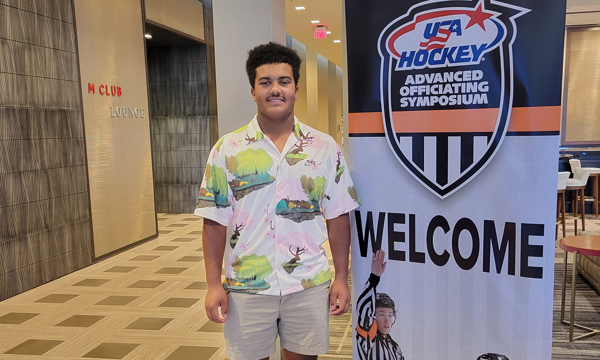Mason Payne made quite the lasting impression when he attended his first USA Hockey Level 1 Officiating Seminar seven years ago.
Payne was seated in the front row furiously writing down notes and asking questions.
He was also the only 9-year-old in the room.
“There was only one other kid there — a 14-year-old who played hockey with my brother,” Payne said. “It was probably the most engaged I’ve ever been, sitting in the front of the stage and taking notes. Everyone there was answering my questions. It was fun.”
Payne was once against the youngest in the room when he attended USA Hockey’s annual Advanced Officiating Symposium, which was held July 28-30 in Columbus, Ohio.
Now 16, his age may surprise some, but Payne’s passion for the game is unmistakable. When he is not refereeing games, he’s on the ice competing for the North Carolina Golden Bears, a U18AAA team out of Raleigh.
Elena Payne, who drove seven hours with her son to Columbus to attend the symposium, said her son’s zeal for hockey carries over to the classroom.
“He’s always been a really good student,” Elena said.
Payne, who attends Bishop McGuinness Catholic High School in Kernersville, North Carolina, said he reads and studies the rule book like he would a textbook.
“As a student, you study something for a test and then once you pass the test, you move on to the next thing,” he said. “In hockey, you study something, and you have to commit it to memory because you might have to use it in a situation that happens three months from now.”
Another difference between the classroom and the rink is there are not hosts of angry fans and players screaming at him and questioning his answers when he takes a math test.
Payne learned at an early age once he puts on the official’s sweater, people don’t care about his age or even if he knows the rulebook forward and backward; they just want him to make the call for their team.
“You get yelled at a lot,” Payne said with a slight smile. “I’ve had parents and coaches question me, ‘Are you even old enough to ref this game?’
I’ve had the parents of guys I used to play with yell at me. You just have to be blind to it and continue to do your job.”
One of the techniques Payne has learned is to take power over the game early.
“I have kind of a control mentality,” he said. “I like to have everything organized.
“Often you have a personal connection with the guys playing, but you have to forget that when you’re on the ice. I’ve had to officiate games between my brother’s teammates or with players that I have coached at one time or another.”
Payne said having an established relationship with players he officiates can be both a positive and a negative thing.
“Sometimes it makes it easier,” he said. “I can go up to a player and say, ‘You know you can’t do that.’ Other times, players expect you to give them a little more leeway and you can’t do that.”
Payne was introduced to hockey when he and his brother, Myles, attended a free hockey camp.
“When Myles started playing, I started playing too,” he said with a laugh. “I just loved the competitiveness of it and the physical play.”
Becoming an official has changed the way Payne approaches the game when he is playing.
“When I was younger, I never liked the rules and I wanted to see how far I could take things,” he said. “As I got older, you kind of know there’s a line you can’t cross.
“Now, I always respect the officials and I always go up and say good game. I try not to yell at them or do anything like that because I know how tough it is to make a call in the moment.”
Story from Red Line Editorial, Inc.



